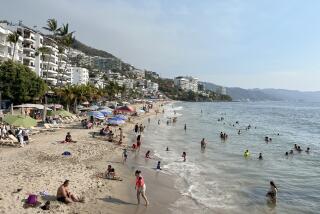Embassies Sweet--and Sour : Lifestyles: The diplomats who live and work all over Washington, D.C., specialize in resolving international crises. But getting along with the neighbors? That can be even trickier.
It was moving day at the Russian embassy and a small parade of dullish-blue vans lumbered along Massachusetts Avenue, loaded with antique furniture and vodka boxes packed with assorted papers and, perhaps, some old secrets.
After generations in a stately old building purchased by their Czarist predecessors near the heart of the capital, Russian diplomats last month relocated to the suburbs under the watchful eye of uniformed U.S. Secret Service police and neighbors such as Charlotte Jones.
“For many people in this city, there’s still a Cold War being waged with embassies and their diplomats,” said the Glover Park resident, standing outside the new embassy, nicknamed by locals “the Kremlin on the Potomac.”
“I mean, look at the buildings, those terrible Soviet-looking things. They scar the neighborhood.”
Such is the world of diplomatic Washington, where 168 foreign missions practice a curious brand of neighborhood diplomacy--not just with one another but with a sometimes-uneasy population of ever-watchful locals.
On tree-shaded streets and especially along Massachusetts Avenue--dubbed Embassy Row--diplomatic headquarters sit alongside homes whose owners are often miffed over where the diplomats park and how often they mow their lawns, and suspicious of just who passes through embassy doors.
While locals worry about diplomatic immunity run amok and millions in unpaid parking-ticket fines amassed by embassies, tourists flock past colorful foreign flags so abundant they need a guidebook to decipher them all.
Indeed, there’s a topsy-turvy geography to Washington’s diplomatic landscape. Embassies of feuding nations sit side-by-side or just blocks apart. Countries that couldn’t be farther away on the world map are unlikely neighbors.
El Salvador is a block away from the former Yugoslavia. The Bolivians are next door to the British and across from the South Africans.
Here, the Austrians rub elbows with the Pakistanis. Cameroon is a neighbor to Venezuela. The Israelis are near their former mortal enemies the Egyptians and Jordanians--close enough to borrow a cup of sugar in a pinch. And the Zimbabweans--they’re next door to the Washington School of Psychiatry.
Embassies of richer nations such as France, Japan and England have sprawling compounds where diplomats host lavish parties, film festivals and cultural exhibits for guests including local residents.
Poorer nations, such as Rwanda, Guatemala or Bangladesh, reside in more modest properties--some in multistory brick structures that might have once housed a single upper-middle-class family.
Some embassies are owned, others leased. Most have their offices--called chancelleries--connected to the ambassador’s residence. Newborn nations sometimes conduct business from a hotel room or desk in an attorney’s office.
“Location is everything, especially in the world of embassies,” said Harry W. Porter, deputy director of the State Department’s Office of Foreign Missions. “Most countries strive for the prestige of a respectable address. Others try to do business on the cheap. We’ve had to inform some that the neighborhood they’ve chosen is dangerous, that it’s just not a good idea to move there.”
*
Until its government changed, the South African embassy held the dubious distinction of attracting the most demonstrators. After President Nelson Mandela was elected, the anti-apartheid protesters were invited as honored guests to his Inauguration Day celebration here.
The Canadians have perhaps the choicest site in Washington--a Pennsylvania Avenue address with sweeping views of the city. Iran’s ramshackle embassy has been abandoned for more than a decade, since its diplomats were banished after a mob takeover of the U.S. embassy in Tehran.
And the Israelis--they’re known for security. No one enters without an appointment--especially after the bombing of an Israeli embassy building in London and a Jewish social services center in Buenos Aires last month. “Inside this building,” said one worker, “you are in the safest place in the world.”
While uneasiness separates some Middle Eastern diplomats, Israeli, Bahraini, Jordanian and Egyptian embassy workers eat lunch together at a tiny park near their chancelleries.
Not all relationships are so courtly. On Massachusetts Avenue, where chancelleries are packed tighter than summer tourists on a subway ride, tempers often flare.
In 1976, when a car bomb killed former Chilean ambassador Orlando Letelier at Sheridan Circle, the noise and flying shrapnel startled diplomats in the nearby embassies of Greece and Turkey, bitter antagonists. Each embassy reported to the State Department that it was under attack by the other. And the Israeli chancellor, traveling in a car near the bomb site, feared he was a target of a Palestinian attack.
*
Meanwhile, Washingtonians are growing more suspicious of immunity enjoyed by foreign diplomats. While embassies are not exactly considered foreign soil, they’re the next closest thing.
“They’re inviolate,” Porter said. “That means anyone on the property is a guest--even local police. Embassies have sometimes not allowed firemen on the premises even to fight a fire.”
There are now 2,700 diplomats and 5,700 of their dependents living in the Washington area--in addition to 4,000 staffers and their 5,000 dependents. All have been granted full criminal immunity.
Last year, 20 serious crimes were committed by some of the 19,500 foreign embassy and consulate personnel nationwide. In Washington, those offenses included arson, burglary, sexual assault, thefts and weapons charges.
Prosecution is nearly impossible.
“In cases where a U.S. citizen is a victim, we seek an explanation from the embassy,” said one senior State Department official. “But with full immunity, a diplomat may not have to cooperate. So, in theory, he could get away with rape, or worse.”
Such immunity makes many locals wary: “I have a rule never to cross the street in front of a car with diplomatic plates,” said Dupont Circle resident Anna Campos. “If they hit you, they’re going to bolt for home. It’s the first thing you learn in this town.”
*
Parking is another sore spot.
Diplomats receive hundreds of parking tickets each year--and ignore most of them. Through last fall, foreign embassies had amassed more than $6.5 million in unpaid citations in recent years, prompting a public outcry.
Embassy employees are technically required to pay fines, but nothing happens if they don’t: Cars with diplomatic plates cannot be booted or impounded.
The Russians are the worst offenders, accounting for three-quarters of diplomatic parking tickets, more than $2.5 million worth in three years.
“Once in a blue moon a Russian diplomat will pay for a ticket,” Porter said. “And you know how often blue moons occur.”
In the late 1970s, the city council passed an ordinance to block embassies from moving into residential neighborhoods, but Congress overturned it.
Embattled embassies will often try to smooth ruffled relations with neighbors over parking, noise and land-use issues. “Embassies have learned to be good neighbors because resident groups can be vocal,” Porter said. “They really get after them.”
The Turks have been in court for several years over an embassy renovation job. And the Italians, planning to build a new embassy in wooded Rock Creek Park, have thrown parties for locals worried about the site’s deforestation.
“Schmoozing neighbors,” Porter said, “is part of the job--they are, after all, diplomats.”
*
For many foreign diplomats, however, Washington can be a lonely assignment--years spent in a far-flung post with little feel for local customs or events unfolding back home.
“The day of the 1991 coup in our country was a very lonely day here,” said Russian counselor Vladimir Pechatnov. “All we could do was watch the television and wonder if we had a home to return to anymore.”
Boniface Karani, a counselor at the Rwandan embassy, still has nightmares over the civil war in his country. “Often, you are out of the loop in Washington,” he said. “I have friends and family members who may not be alive anymore.”
Outside the Rwandan embassy, high school students from Kansas City shouted questions at the teen-age daughters of a diplomat sitting on the front steps: “Why all the killing and violence?” they asked. “Why isn’t anything being done?”
Inside, standing next to a three-foot-tall stuffed Rwandan gorilla and a collection of tribal spears, Karani said, “You Americans had your own Civil War and you fought until the matter was settled--no outsiders got involved. Give us the same chance to settle things without outside intervention.”
(Several days later, President Clinton announced that the United States would no longer recognize the Rwandan government, and all diplomats were vacated from the embassy.)
But perhaps the Russians tell the real tale of changing embassy life: For years, they represented the very image of the unwanted, mistrusted outsider.
In 1969, the Soviets purchased a 10-acre former Veterans Administration hospital on a hill overlooking the capital. The deal was criticized by politicians who claimed the snoopy Soviets might intercept sensitive intelligence transmissions from their perch.
The moving day was delayed for decades, most recently in retaliation over Washington’s concerns that a new U.S. embassy in Moscow was riddled with intelligence bugs. In 1992, the Russians were finally given the go-ahead to make the move.
Like other former Soviet republics, the Russians say they want to put their secretive pasts behind them. Still, counselor Pechatnov says he will miss the 16th Street chancellery--a secret-soaked old building that saw years of intrigue.
“These walls,” he said, “have many stories to tell.”
More to Read
Start your day right
Sign up for Essential California for news, features and recommendations from the L.A. Times and beyond in your inbox six days a week.
You may occasionally receive promotional content from the Los Angeles Times.







